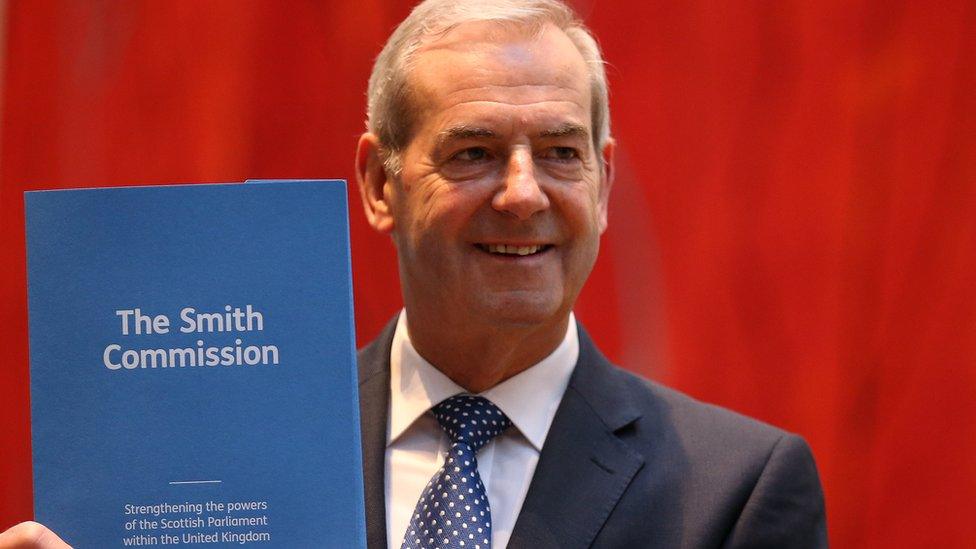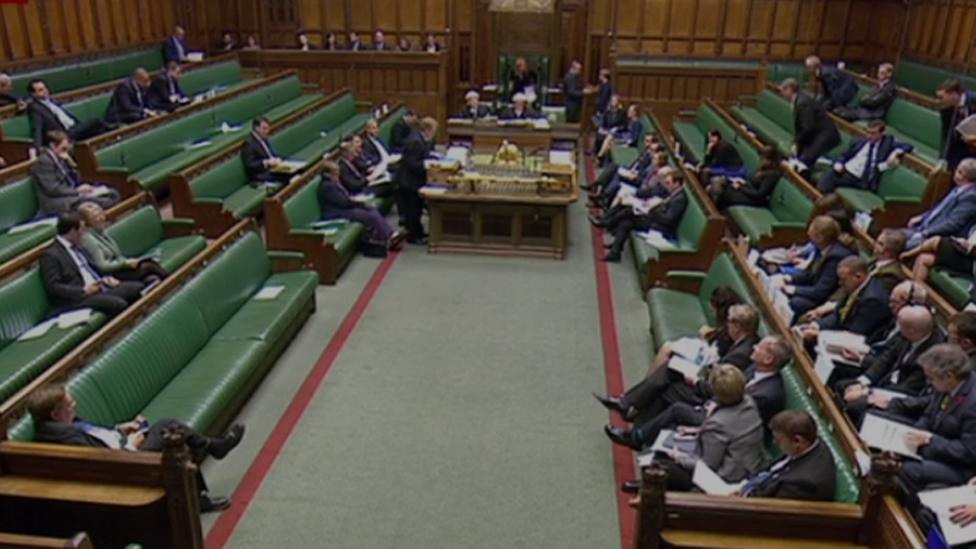Lord Smith says Scotland Bill 'honours agreement'
- Published

Lord Smith chaired the commission, which included representatives of the five Holyrood political parties
The man who chaired the Smith Commission, external on Scotland's devolution settlement has said the Scotland Bill honours the agreement that was reached.
Lord Smith of Kelvin also said his cross-party commission's welfare power recommendation had been "delivered in full".
The bill was backed by the House of Commons on Monday.
The SNP did not oppose it despite saying the bill fell "far short" of the Smith recommendations.
Lord Smith was speaking as a Holyrood committee said the Scotland Bill contained a "clear breach" of the recommendations.
'Employment provisions'
Holyrood's Devolution Committee called on the UK government to make further amendments to the Bill before it goes before the House of Lords.
It said: "At this stage, no amendments have been made to the employment provisions, the clause on disability or placing all three strands of the Legislative Consent Convention into statute. The first is a clear breach of the cross-party agreement in Smith."
But Lord Smith told ITV Border that the bill had "honoured what the five parties agreed" during the commission talks that were held in the wake of last September's independence referendum.

A series of UK government amendments were backed during Monday's debate on the Scotland Bill
He said: "There were three things: one was taxation which I always thought was relatively straightforward in terms of delivery. One was of welfare which is very complicated, but actually I honestly believe that's now been delivered in full.
"The third area is fiscal framework. Before we get too technical about it, it just means the financial mechanism to make the other two work. And without that, the other two will not work.
"Now that's not agreed. It's not actually needing legislation, it just needs two parties to make sure the thing will work probably. That probably won't be agreed until early next year. But that's the only bit that's missing.
"The legislation part, the bit that's gone through the House of Commons and will go through the House of Lords, I believe actually honours what we agreed."
He backed the Scottish government's reluctance to confirm that it will sign up to the Scotland Bill until the fiscal framework is agreed.
"Unless it is a framework that works, I guess people should not be signing up to it," he said.
"But there are two people negotiating on this thing. And they managed to agree on taxation, and they managed to agree to a lot of people's surprise on welfare, and in my view delivered what we said. I have every confidence they will come to an arrangement on fiscal powers, on fiscal framework."
Responding to Lord Smith's comments, Prime Minister David Cameron said: "Scotland wanted more devolution. The Smith Commission was set up to deliver more devolution. And Lord Smith has now unequivocally said that Smith has been delivered. Smith confirmed Smith.
"A vow was made, a vow was kept. Scotland will have that powerhouse parliament. Now the debate can shift to how those powers should be used, that's the debate that now needs to start."
During Monday's debate on the Scotland Bill in the Commons, a series of amendments tabled by the UK government aimed at clarifying and strengthening some sections of the bill were approved.
'Far short'
These included control over abortion law, which was opposed by Labour, and enhanced powers over welfare, including the ability to top-up any cuts to tax credits made by the UK government.
But amendments tabled by the SNP and Labour were rejected.
The SNP's leader at Westminster, Angus Robertson, said the sole purpose of the Scotland Bill had been to implement the Smith Commission in full, but argued that the bill still fell "far short".
He added: "We have seen with this debate a Westminster failure to support the devolution of powers over tax credits, industrial relations and workers' rights powers and on the sovereignty of the people of Scotland.
"People should look and learn because, if this is the way to bring forward legislation, we don't need it."